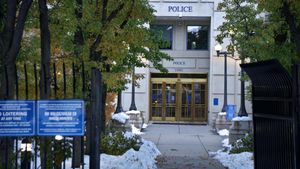Harlem Week is more than just a series of events; it's the heartbeat of a community reborn. Celebrated this year for its 50th anniversary, it reminds New Yorkers and visitors alike of the transformation of Harlem from its darkest days to its vibrant present.
Back in 1974, Harlem was often described as desolate, marked by abandoned buildings, crime reports, and statistics highlighting its decline. Such disinvestment often characterized the heart of this historically African American neighborhood, which was losing its spirit as urban flight led wealthier residents away.
Thanks to visionary leaders like Percy Sutton, the borough president at the time, Harlem began to see the seeds of revival. He spearheaded initiatives aimed at reviving the community through culture, arts, and entrepreneurship.
What started as Harlem Day transformed over the years and evolved to become Harlem Week, featuring 18 days of events spotlighting the community’s rich legacy. The dynamic celebration culminated last Sunday, marking half a century of resilience and strength.
According to Rev. Al Sharpton, whose National Action Network is based in Harlem, “Harlem Week stands as the constant line through the last 50 years of America’s most historic Black neighborhood.” He emphasized how the dreams of Sutton and other leaders like him have continued to flourish.
Despite the challenges posed by the harsh social climate of the 70s, Harlemites who stayed were determined to rewrite the narrative. Local families, mostly low-income African Americans, yearned for hope amid the discouragement they faced.
On the inaugural Harlem Day, influential figures from various sectors banded together to present the community with something to celebrate. Notable names like Maya Angelou and Sidney Poitier collaborated to change the perception of Harlem, turning the spotlight not on its troubles, but on its tremendous legacy.
The day’s festivities began with concerts and performances by local artists, boosting morale and showcasing Harlem's undeniable talent. With the symbolic renaming of 7th Avenue to Adam Clayton Powell Jr. Boulevard, the event represented more than culture; it was about acknowledgment and respect for the neighborhood’s heritage.
Lloyd Williams, co-founder of Harlem Day, recounted how the success of this event ignited similar movements across other cities experiencing decline. Because of its immediate impact, organizers decided to make Harlem Day an annual celebration, and eventually, it expanded to the full month we now recognize as Harlem Week.
This year’s celebrations were nothing short of spectacular and featured diverse musical performances. Hip-hop artist Fabolous headlined, alongside tributes to other Harlem legends like Harry Belafonte.
The week also highlighted Harlem’s rich musical traditions, offering jazz, reggae, R&B, and gospel throughout the festivities. Hundreds of vendors added to the lively atmosphere by offering food and merchandise, making the celebration accessible and enjoyable for everyone.
Along with entertainment, Harlem Week emphasized community empowerment through various health and financial literacy initiatives. The Harlem Health Village offered screenings and valuable workshops, ensuring attendees left with more than just memories; they gained knowledge and resources for their future.
Children were particularly celebrated during the week, receiving back-to-school backpacks filled with supplies to prepare them for the upcoming school year. Organizers ensured the events would cater to families, fostering unity and joy within the community.
Harlem Week continues to pay homage to the great intellects and creatives from the Harlem Renaissance and beyond. Icons like W.E.B. Du Bois and Langston Hughes are honored, reminding participants of the rich legacy of the neighborhood.
While the late 1960s and 70s witnessed death and despair through events like Malcolm X’s assassination, Harlem's return to vitality stands as testimony to the resilience and creativity of its residents. The neighborhood faced significant socioeconomic challenges during those years, but innovation and cultural assertion always lingered just beneath the surface.
Malik Yoba, born during the brink of Harlem’s decline, reflected on this stark disparity between realities. He grew up playing among abandoned lots and often compared his surroundings to schools attended by peers of wealthier backgrounds.
The differences sparked within him a fire to tell Harlem's stories through his acting career. Today, Yoba continues to showcase the spirit of Harlem, actively working to combat issues like redlining through his real estate endeavors.
Hazel Dukes, another influential figure and 92-year-old civil rights activist, mirrors Yoba's sentiments on the inequalities faced by the community. Having fought against discrimination throughout her life, she believes the roots of those struggles are deeply intertwined with Harlem’s evolution.
Yet, Harlem today tells another story, where property is highly coveted, driven by the allure of gentrification and rich cultural heritage. Dukes remarks, “There was a waiting list because everybody wanted to live in Harlem,” showcasing the neighborhood's newfound desirability.
But the revival is multi-faceted; it's about more than gentrification and real estate. It's also about ensuring the legacy and spirit of Harlem's past remain alive amid the change, preserving its artistic heart.
Harlem Week serves as more than just celebration; it's also about remembrance and resistance. Renowned establishments like the Apollo Theater and Schomburg Center continue to stand as testaments to Harlem's past, cherished foundations for the community.
Still, the road to revitalization hasn’t come without its challenges. The struggles for equity, inclusion, and representation for all residents continue to shape the narrative of today’s Harlem.
Participants celebrated Harlem Week not only for what it has accomplished but for the work still required to maintain its vibrancy. “We can’t forget where we came from,” emphasized Williams, urging everyone to maintain awareness and connectedness to their roots.
It's evident Harlem Week isn’t just about marking anniversaries; it's about embracing the future. The legacy continues, intertwining new endeavors with the rich history of the iconic neighborhood.
So, as the streets filled with life, laughter, and celebration, Harlem Week 2024 has once again illuminated the power of unity, culture, and community spirit. With burgeoning hope, the future looks vibrant and endless just like the spirit of Harlem itself.



